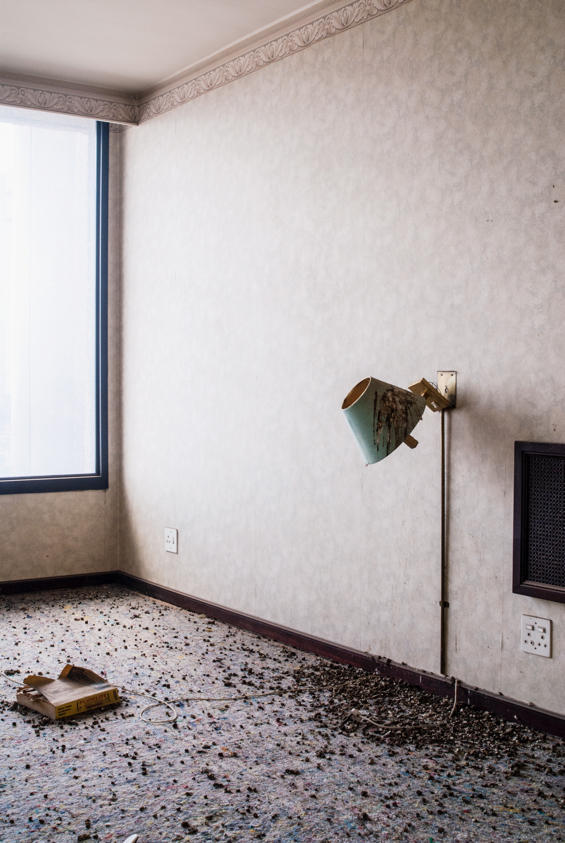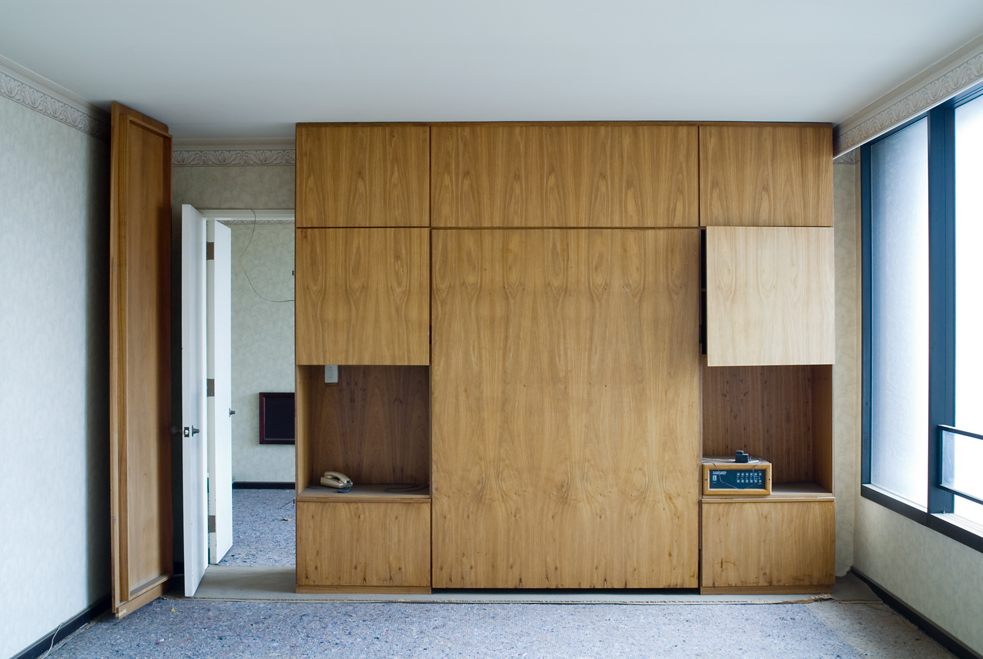Inside the ghostly hotel that symbolises South Africa's past
- Text by Cian Traynor
- Photography by Yvonne Mueller and Leif Bennett

Yvonne Mueller and Leif Bennett were taking a tour through downtown Johannesburg, guided by a local artist, when they noticed a building that didn’t look quite right: a 30-floor hotel that’s been closed for 20 years but guarded around the clock.
The Carlton is a former 5-star complex with an imposing history. It has witnessed landmark political moments, entertained celebrities and even been home to a murder. But before Yvonne and Leif had heard the stories, all they wanted to do was get inside.


“We felt a bit lost, really,” says Yvonne about sneaking in. “It was quite scary, especially being all alone on one of the higher floors. The lower floors had almost no light and we needed a flashlight, but it was an adventure because you would never know what to find next.”
It didn’t take long for the pair to come up with an idea: a photo project documenting a ghostly space that “managed to encapsulate so much of the history of a country we ourselves did not know very well yet.”
Yvonne and Leif are an artistic couple from Switzerland with interweaving backgrounds. Leif’s father was a photographer, so he grew up in Schaffhausen with black-and-white prints strewn across the house and bookshelves teeming with histories of the medium.

The 43-year-old inherited his dad’s analogue gear but is largely self-taught as an artist, placing huge emphasis on the value of experimentation. Yvonne, meanwhile, grew up in Bern and worked in finance before pursuing her real passion by studying art in Basel and earning scholarships at studios in Paris and South Africa.
They met at a communal studio space, had a daughter together and found ways to spark each other’s creativity. “Unfortunately we cannot work together very well,” says Yvonne, who’s 44. “We tend to end up in long discussions and even fights! Sometimes we have a vastly different outlook on things and it can be difficult to find a compromise. But we are most at ease travelling together.”


In Johannesburg, the pair were astonished by the Carlton’s empty shell and began to research its history. Past guests included Henry Kissinger, Hillary Clinton, Margaret Thatcher, Whitney Houston and Mick Jagger; there were strikes, protests, bomb threats and high-profile banquets.
Leif and Yvonne established that Nelson Mandela lived in the hotel’s presidential suite during South Africa’s transition from white-minority rule. He held his 75th birthday celebration in its ballroom and, in 1994, gave a victory speech there announcing that he would be South Africa’s next president.
But within just a few years, the Central Business District it was located in deteriorated rapidly and its 670 rooms became impossible to fill.


In 1997, two hotel employees murdered one of their managers after he found them drinking on duty. The Carlton was closed within five months, having lost $4m that year alone, and its contents were gradually sold off.
When Leif and Yvonne found an old video interview with Mandela recorded in the hotel, they tracked down the exact spot it was taken in – plants now growing out of the floor, its decorative wall laid bare. Outside, security guards were patrolling its various back entrances to fend off vandalism and illegal occupation.


Capturing such contrasts seemed to provide a profound reflection, not just on what was once the southern hemisphere’s best hotel, but a symbol of of South Africa’s complex history.
“At its completion in the 1970s, the Carlton Hotel was deemed a liberal hub where petty apartheid laws managed to be eroded,” says Yvonne.
“On the other hand, it stands as a monument of financial gains made on the backs of the disenfranchised… It remains a stark reminder of international collusion to uphold, or turn a blind eye, to a broken system.

“South African society will likely have to live with this monument, as it looks expensive to topple, and so perhaps it will once again become symbolic when it has an opportunity to be transformed into something new.”
Inside the Carlton Hotel Johannesburg is published by Kehrer Verlag.
Enjoyed this article? Like Huck on Facebook or follow us on Twitter.
You might like

As Kneecap and Bob Vylan face outcry, who really deserves to see justice?
Street Justice — Standing in for regular newsletter columnist Emma Garland, Huck’s Hard Feelings host Rob Kazandjian reflects on splatters of strange catharsis in sport and culture, while urging that the bigger picture remains at the forefront of people’s minds.
Written by: Robert Kazandjian

Alex Kazemi’s Y2K period novel reminds us that the manosphere is nothing new
New Millennium Boyz — Replete with MTV and endless band t-shirt references, the book follows three teenage boys living in 1999 USA as they descend into a pit of darkness. We spoke to its author about masculinity, the accelerated aging of teenagers, and the rebirth of subcultures in the algorithm age.
Written by: Isaac Muk

In photos: The people of Glastonbury’s queer heart The NYC Downlow
Elation and family — Once a year, a meatpacking warehouse nightclub springs up in Glastonbury’s South East corner and becomes a site of pilgrimage for the festival’s LGBTQ+ scene. We met the people who make The NYC Downlow so special.
Written by: Isaac Muk

Inside the weird world of audio porn
Porn without pictures — Storyline-driven and ethical, imageless erotica exploded during the pandemic. Jess Thomson speaks to the creators behind the microphones.
Written by: Jess Thomson

Coming of age in New York’s ’70s punk heyday
I Feel Famous — Through photographs, club flyers and handwritten diary entries, Angela Jaeger’s new monograph revisits the birth of the city’s underground scene, while capturing its DIY, anti-establishment spirit.
Written by: Miss Rosen

We are all Mia Khalifa
How humour, therapy and community help Huck's latest cover star control her narrative.
Written by: Alya Mooro

